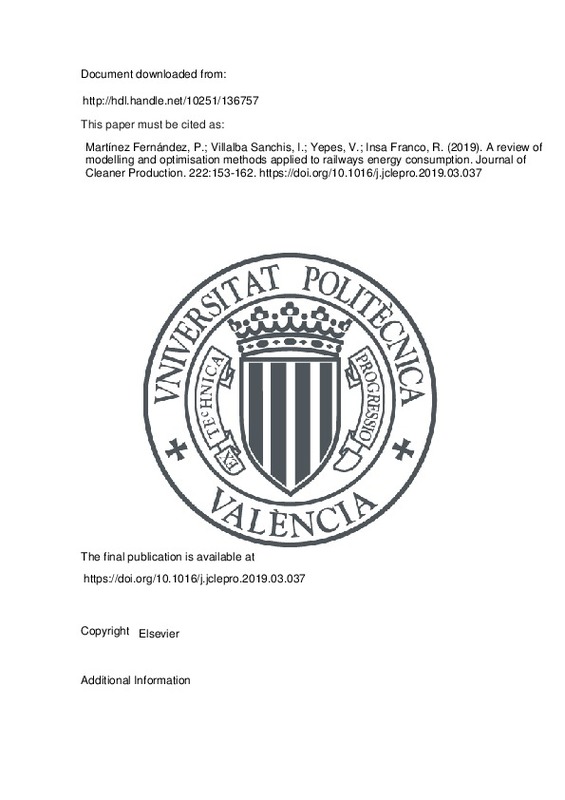JavaScript is disabled for your browser. Some features of this site may not work without it.
Buscar en RiuNet
Listar
Mi cuenta
Estadísticas
Ayuda RiuNet
Admin. UPV
A review of modelling and optimisation methods applied to railways energy consumption
Mostrar el registro sencillo del ítem
Ficheros en el ítem
| dc.contributor.author | Martínez Fernández, P.
|
es_ES |
| dc.contributor.author | Villalba Sanchis, Ignacio
|
es_ES |
| dc.contributor.author | Yepes, V.
|
es_ES |
| dc.contributor.author | Insa Franco, Ricardo
|
es_ES |
| dc.date.accessioned | 2020-02-12T21:01:40Z | |
| dc.date.available | 2020-02-12T21:01:40Z | |
| dc.date.issued | 2019 | es_ES |
| dc.identifier.issn | 0959-6526 | es_ES |
| dc.identifier.uri | http://hdl.handle.net/10251/136757 | |
| dc.description.abstract | [EN] Railways are a rather efficient transport mean, and yet there is increasing interest in reducing their energy consumption and making them more sustainable in the current context of climate change. Many studies try to model, analyse and optimise the energy consumed by railways, and there is a wide diversity of methods, techniques and approaches regarding how to formulate and solve this problem. This paper aims to provide insight into this topic by reviewing up to 52 papers related to railways energy consumption. Two main areas are analysed: modelling techniques used to simulate train(s) movement and energy consumption, and optimisation methods used to achieve more efficient train circulations in railway networks. The most used methods in each case are briefly described and the main trends found are analysed. Furthermore, a statistical study has been carried out to recognise relationships between methods and optimisation variables. It was found that deterministic models based on the Davis equation are by far (85% of the papers reviewed) the most common in terms of modelling. As for optimisation, meta-heuristic methods are the preferred choice (57.8%), particularly Genetic Algorithms. | es_ES |
| dc.language | Inglés | es_ES |
| dc.publisher | Elsevier | es_ES |
| dc.relation.ispartof | Journal of Cleaner Production | es_ES |
| dc.rights | Reserva de todos los derechos | es_ES |
| dc.subject | Railways | es_ES |
| dc.subject | Energy efficiency | es_ES |
| dc.subject | Modelling | es_ES |
| dc.subject | Optimisation | es_ES |
| dc.subject | Meta-heuristics | es_ES |
| dc.subject.classification | INGENIERIA DE LA CONSTRUCCION | es_ES |
| dc.subject.classification | INGENIERIA E INFRAESTRUCTURA DE LOS TRANSPORTES | es_ES |
| dc.title | A review of modelling and optimisation methods applied to railways energy consumption | es_ES |
| dc.type | Artículo | es_ES |
| dc.identifier.doi | 10.1016/j.jclepro.2019.03.037 | es_ES |
| dc.rights.accessRights | Abierto | es_ES |
| dc.contributor.affiliation | Universitat Politècnica de València. Instituto del Transporte y Territorio - Institut del Transport i Territori | es_ES |
| dc.contributor.affiliation | Universitat Politècnica de València. Departamento de Ingeniería e Infraestructura de los Transportes - Departament d'Enginyeria i Infraestructura dels Transports | es_ES |
| dc.contributor.affiliation | Universitat Politècnica de València. Escuela Técnica Superior de Ingenieros de Caminos, Canales y Puertos - Escola Tècnica Superior d'Enginyers de Camins, Canals i Ports | es_ES |
| dc.contributor.affiliation | Universitat Politècnica de València. Departamento de Ingeniería de la Construcción y de Proyectos de Ingeniería Civil - Departament d'Enginyeria de la Construcció i de Projectes d'Enginyeria Civil | es_ES |
| dc.description.bibliographicCitation | Martínez Fernández, P.; Villalba Sanchis, I.; Yepes, V.; Insa Franco, R. (2019). A review of modelling and optimisation methods applied to railways energy consumption. Journal of Cleaner Production. 222:153-162. https://doi.org/10.1016/j.jclepro.2019.03.037 | es_ES |
| dc.description.accrualMethod | S | es_ES |
| dc.relation.publisherversion | https://doi.org/10.1016/j.jclepro.2019.03.037 | es_ES |
| dc.description.upvformatpinicio | 153 | es_ES |
| dc.description.upvformatpfin | 162 | es_ES |
| dc.type.version | info:eu-repo/semantics/publishedVersion | es_ES |
| dc.description.volume | 222 | es_ES |
| dc.relation.pasarela | S\380314 | es_ES |







![[Cerrado]](/themes/UPV/images/candado.png)

